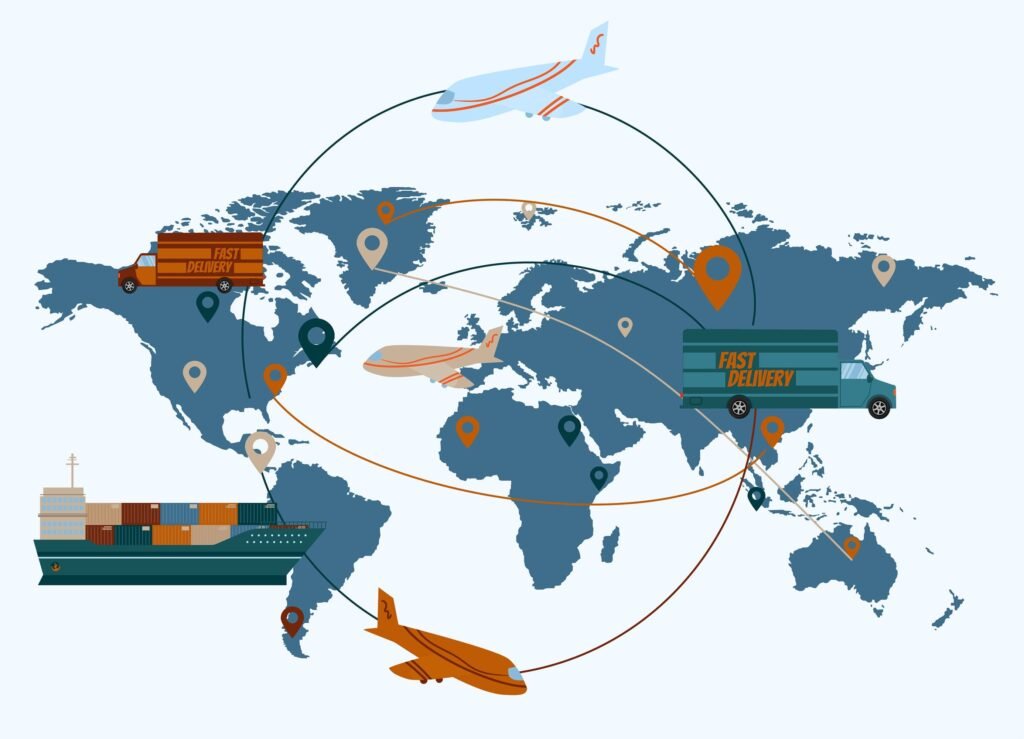Export in Global Supply Chain
What is Export in Global Supply Chain?
- Export: Selling and shipping goods or services produced in one country to another country.
- Global Supply Chain: The worldwide system of sourcing, manufacturing, transporting, warehousing, and distributing goods across multiple countries.
Role of Export in Global Supply Chain:
- Market Expansion – Businesses can reach international customers.
- Cost Efficiency – Companies may produce in low-cost countries and export globally.
- Resource Utilization – Countries can sell surplus products abroad.
- Economic Growth – Exports generate revenue, jobs, and foreign exchange.
- Trade Balance – A key factor in the economic relationship between countries.
Example:
- An Indian textile manufacturer exports cotton garments to the U.S. and Europe.
- The raw cotton may be sourced locally, stitched in India, shipped via sea freight, warehoused in another country, and finally sold in global retail stores.
👉 In short:
Export in the global supply chain is the process of moving goods and services across borders, connecting producers and consumers worldwide, and supporting international trade.
What are the certificate and licence required to become Exporter in Global Supply Chain?

To become an Exporter in the Global Supply Chain, you need certain certificates and licenses depending on your country and the type of products you export.
Since you are in India, here’s the list (with international relevance also):
📑 Certificates & Licenses Required for Exporter
1. Company Registration
- What: Register your business as a proprietorship, partnership, LLP, or private limited company.
- Why: To legally operate as a business entity.
2. PAN (Permanent Account Number)
- What: Issued by the Income Tax Department (India).
- Why: Mandatory for all financial transactions, including exports.
3. Import Export Code (IEC)
- Issued by: DGFT (Directorate General of Foreign Trade), India.
- Why: Compulsory for exporting or importing goods. Without IEC, customs will not clear your shipments.
4. GST Registration
- What: Goods and Services Tax (GST) registration.
- Why: Required for tax purposes on export services and to claim refunds.
5. Registration Cum Membership Certificate (RCMC)
- Issued by: Export Promotion Councils (EPCs), e.g., APEDA, FIEO, EEPC.
- Why: Mandatory for availing export incentives and benefits under foreign trade policies.
6. Product-Specific Certifications
(depends on what you export)
- Food Products → FSSAI License, APEDA Registration, HACCP, ISO 22000.
- Agricultural Products → Plant Quarantine Certificate, Phytosanitary Certificate.
- Textiles → AEPC Registration.
- Pharma / Medical → CDSCO approval, WHO-GMP Certificate.
- Engineering Goods → EEPC Membership, BIS Certificate.
7. Logistics & Customs Documents
- Bill of Lading / Airway Bill
- Shipping Bill (filed with Customs via ICEGATE)
- Commercial Invoice & Packing List
- Certificate of Origin (issued by Chambers of Commerce or Export Councils)
8. Quality & International Certifications (Optional but Beneficial)
- ISO Certifications (9001, 14001, 45001, etc.) → Improves global trust.
- CE Marking (for Europe) → For electronics, machinery, toys, etc.
- US FDA Approval → For food, cosmetics, pharma exports to USA.
- Halal / Kosher Certification → For Middle East & Jewish markets.
✅ In summary:
The basic must-have license is IEC (Import Export Code).
Other certifications depend on product type and target market.
What are the inspection and compliance audit like SMETA, CTPAT, Ethical Audit required to become Exporter in Global Supply Chain?
When you want to become an Exporter in the Global Supply Chain, it’s not only about licenses (like IEC, RCMC) but also about inspection and compliance audits.
Big international buyers (like Walmart, Amazon, IKEA, H&M, Unilever) will only buy if you pass such audits, because they must ensure safety, legality, ethics, and security in their supply chains.
Here’s a clear breakdown for you 👇
🔍 Key Inspections & Compliance Audits for Exporters
1. SMETA Audit (Sedex Members Ethical Trade Audit)
- Focus: Ethical practices in workplace.
- Covers:
- Labour standards (no child labour, fair wages, safe working hours)
- Health & Safety
- Environment
- Business ethics (anti-bribery, transparency)
- Why: European & UK buyers especially demand SMETA before approving suppliers.
2. CTPAT (Customs Trade Partnership Against Terrorism)
- Issued by: U.S. Customs and Border Protection (CBP).
- Focus: Supply chain security against smuggling, terrorism, illegal trade.
- Covers:
- Cargo security
- Container inspection
- Cyber security
- Business partner verification
- Why: Needed if you want to export to the USA. Without CTPAT compliance, shipments face delays and extra inspections.
3. Ethical Audit (SA8000 or BSCI)
- SA8000 (Social Accountability International): Focuses on worker rights, workplace safety, fair treatment.
- BSCI (Business Social Compliance Initiative): Widely accepted in Europe for social compliance.
- Why: Ensures global brands that your factory treats employees ethically.
4. Quality Management System Audits
- ISO 9001 – Quality management
- ISO 14001 – Environmental management
- ISO 45001 / OHSAS 18001 – Occupational health & safety
- Why: These standards build trust with international buyers.
5. Environmental & Sustainability Audits
- Higg Index / ZDHC (Zero Discharge of Hazardous Chemicals) – Common in textiles, fashion, footwear.
- Carbon Footprint & ESG audits – Required by eco-conscious brands.
- Why: Buyers want sustainable and eco-friendly suppliers.
6. Product-Specific Inspections
- Food & Agriculture → HACCP, FSSAI, GlobalG.A.P, Organic certification.
- Pharma & Medical → GMP, WHO pre-qualification, US FDA audit.
- Electronics & Machinery → CE Marking (Europe), UL (USA), BIS (India).
- Textiles → OEKO-TEX, GOTS (organic cotton).
7. Factory & Social Compliance Inspections
- Conducted by 3rd Party Auditors (Deming Certification, Six Sigma, UKJAS, Deming Ratings).
- Buyers ask auditors to visit your factory and check:
- Fire safety & building safety
- Worker contracts, attendance, salary slips
- Health & safety equipment
- Pollution control
✅ In summary:
- To export globally, you must pass ethical, quality, safety, and security audits.
- Minimum recommended:
- SMETA / BSCI (Ethical Audit)
- CTPAT (for USA exports)
- ISO 9001 & ISO 14001 (for quality & environment)
- Industry-specific certifications (Food, Pharma, Textiles) will depend on your product.
